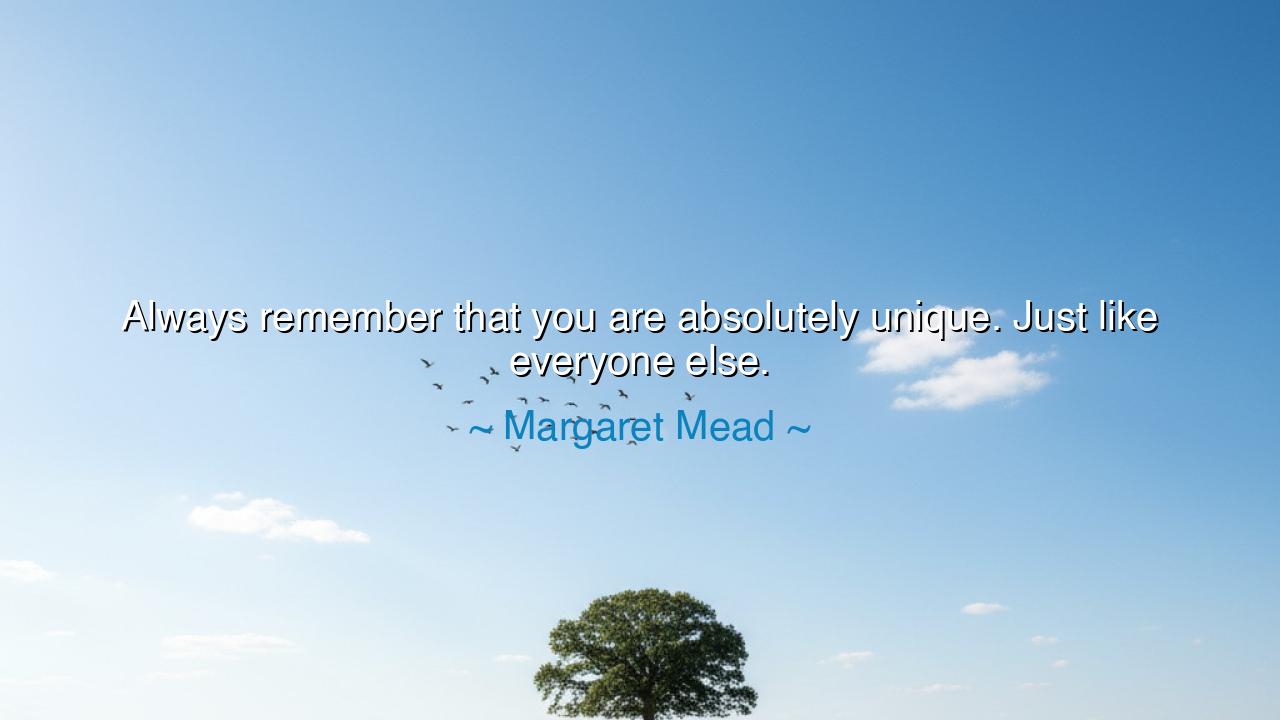
Always remember that you are absolutely unique. Just like






"Always remember that you are absolutely unique. Just like everyone else." – Margaret Mead
In the great dance of existence, each of us is called to walk a path that is uniquely our own, yet somehow intertwined with the footsteps of all others. Margaret Mead, the renowned anthropologist, speaks to a profound truth about the nature of humanity: each of us is, in a sense, unique, yet we are all bound by the same forces, sharing experiences that echo through time. The wisdom she imparts is not one of individualism, but of understanding that our uniqueness is woven into a tapestry of shared experiences, struggles, and triumphs. It is a reminder that while we may feel isolated in our individuality, we are never truly alone in our human journey.
In the ancient world, the concept of individuality was both revered and feared. The great Greek philosophers often grappled with the tension between the individual and the society. Socrates, for instance, stood as a figure of individual integrity and thought, challenging the norms of Athens, yet his fate—forced to drink hemlock for his beliefs—illustrates the fragility of the individual in the face of societal expectations. His uniqueness was both a gift and a burden, just as Mead suggests in her reflection: we are unique, but this uniqueness is also a shared experience, for in being unique, we are part of something larger than ourselves—humanity itself.
The Romans too understood the duality of individuality and the collective. Consider Julius Caesar, who, in his rise to power, wielded his personal ambition and vision to reshape the course of history. Yet, despite his extraordinary achievements, he was, in the end, merely a man—one among many who sought to influence the destiny of a nation. Caesar’s legacy shows that even the most towering figures in history are but one part of a greater whole. In the same way, Mead’s quote reminds us that while we each have our own unique gifts, we are always part of a larger human story, one that is shaped by the contributions of countless others.
Take, for example, the story of the Buddha—born Siddhartha Gautama—who left his life of privilege in search of enlightenment. His quest for personal understanding ultimately led to teachings that have impacted billions. Yet, his journey was not entirely his own; it was shaped by the lives of countless others he met along the way, who influenced and challenged his thinking. The Buddha’s unique path to enlightenment speaks to the truth that we each forge our own way, but our experiences, thoughts, and actions are never isolated—they are deeply intertwined with the lives of those around us. Each human life, in its uniqueness, is also a reflection of the shared journey of all.
Mead’s words also carry a sense of humor, a lighthearted acknowledgment of our human paradox: we are all special, yet we are all the same. The contradiction is at the very heart of what it means to be human. We are individuals, with our own dreams, fears, and desires, yet we are shaped by the same forces of history, biology, and culture. The great epic poems of the past, such as Homer’s Iliad, tell the stories of legendary heroes, each with their unique traits—yet beneath these stories lies a universal truth: the struggles and aspirations of one are mirrored in the lives of others. Each hero, though unique, is part of the greater story of human experience.
In the Renaissance, thinkers such as Michelangelo and Leonardo da Vinci were celebrated for their genius and individuality, yet their work was deeply influenced by the collective knowledge of those who came before them. Their art, their inventions, their scientific discoveries were not born from a void, but from the accumulated wisdom of centuries. They embodied the very essence of Mead’s wisdom: the individual is shaped by the collective, and even the most extraordinary genius cannot escape the shared human journey that unites us all. Uniqueness, in the end, is a reflection of both the individual’s contribution and the larger human story that surrounds them.
The lesson of Mead’s quote is clear: in our pursuit of individual greatness, we must never forget the interconnectedness of our lives. We are each, in our own way, unique, but our uniqueness is a reflection of the shared experiences that bind us as humans. As you move through life, remember that while your path may be your own, it is also shaped by the footprints of others. Your uniqueness is both a gift and a responsibility, one that should be embraced with humility and recognition of the collective journey we all share. Let your life be a testament to the idea that in the grand tapestry of existence, your thread is both distinct and connected, a unique part of the whole.






AAdministratorAdministrator
Welcome, honored guests. Please leave a comment, we will respond soon